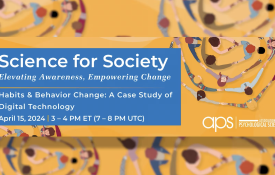-

That Sounds Right: Hearing Objects Helps Us Recognize Them More Quickly
Audio associations can help us recognize objects more quickly, suggesting that sounds can help us make fine-grained discriminations between objects, new research suggests.
-

Tackling the Force of Habit
How much of our behavior is habitual? APS President Wendy Wood and her colleagues answered this question on April 16 during “Habits and Behavior Change—A Case Study of Digital Technology,” an APS Science for Society webinar. The webinar is now available for registrants and APS members.
-

New Content From Perspectives on Psychological Science
A sample of research on referential communication in language and gesture, personality science in the digital age, understanding collective intelligence, and much more.
-

Shaping Kinder Kids Through Parental Example
Podcast: When kids witness their parents engaging in warm and positive interactions, it could have a positive effect on the children themselves. Hear from Brian Don, who discusses his new theory on the topic, what it could mean for future research, and much more.
-
Remembering Daniel Kahneman: A Mosaic of Memories and Lessons
The loss of Daniel Kahneman looms large over the behavioral sciences. The pathbreaking and Nobel-winning psychologist has died at the age of 90. His work deepened our understanding of how the mind works and how people make decisions. In doing so, it transformed the fields of psychology and economics. ... We bring together more than 30 entries. The authors include some of Kahneman’s first students who went on to become psychologists themselves, former graduate students and postdocs, and the psychologists, economists, and others who collaborated with or were deeply influenced by him.
-
Why a Cognitive Scientist Put a Head Cam on His Baby
When Luna was seven months old, she began wearing, at the behest of her scientist father, a hot-pink helmet topped with a camera that would, for about an hour at a time, capture everything she saw, heard, and said. Her dad, Brenden Lake, is a cognitive scientist at New York University, where he thinks about better ways to train artificial intelligence. At home, he trains human intelligence, by which I just mean that he’s a dad. On a recent Sunday morning, he held up a robot puppet and asked Luna, who was meting out her wooden toys, “That’s for robot?” “Oh, goodness!” he added in a silly Muppet voice. ... That said, AI models could also inspire new ideas about how children learn.

